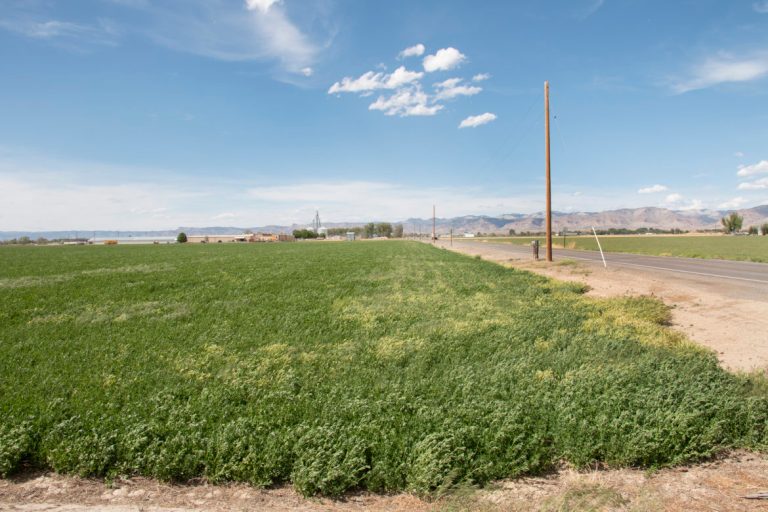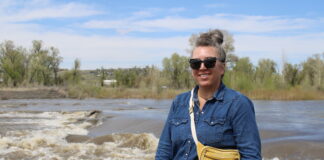
After nearly a year’s worth of meetings, a work group has not reached a consensus about what Colorado should do to prevent investors from profiting off of speculating on the state’s water.
A report released last week by a group of water managers, policy experts and users — who were convened to explore ways to strengthen current anti-speculation law — lays out a list of concepts but does not give clear direction to state legislators about which concepts to pursue.
“Due in part to the drawbacks that the Work Group identified for each of the brainstormed concepts in Section 5, and a lack of consensus, the Work Group does not recommend any of the concepts for implementation,” the report reads.
The work group was made up of representatives from across water sectors, including Front Range municipal-water providers, Western Slope agricultural-water users, nonprofit organizations and others. At the direction of state lawmakers, the work group looked into how legislation could be enacted or amended to crack down on investment water speculation. The group defined investment water speculation as the purchase of water rights with the primary purpose of profiting from the increased value of the water in a future sale.
The lack of consensus or recommendations underscores how difficult it is to answer the thorny question at the heart of the issue: How can the government balance protecting a public resource from profit-seeking investors without infringing on private-property rights?
“The lack of consensus is informative in and of itself,” said state engineer Kevin Rein, who co-chaired the work group. “That tells the (Water Resources Review) Committee a lot right there.”

Eight concepts
Under Colorado law, a water-rights holder must put their water to “beneficial use,” meaning they must use the water for what it was decreed, such as irrigating crops. But Colorado also treats the right to use water as a private-property right. People can buy and sell water rights and change what the water is allowed to be used for by getting the approval of the water court.
This system creates an opening for investors who see water as an increasingly valuable commodity in a water-short future, driven by climate change. A New York City-based private equity fund, Water Asset Management, is now the largest landowner in the Grand Valley Water Users Association, which provides water from the Colorado River to the farmland of Fruita, Mack and Loma. Concern about WAM’s activity in the Grand Valley was a main reason that legislators convened the anti-speculation work group through 2020’s Senate Bill 48.
Of the 19 concepts presented in the report, eight were identified as having the potential to reduce investment water speculation on a large scale. These include taxing profits from the sale of water rights; eliminating agriculture tax benefits when water is removed from the land; encouraging local governments to police speculation through their 1041 powers; and creating a right of first refusal for a public entity to purchase water rights for long-term irrigation use for public benefit.
The most ambitious of the concepts, Concept J, is creating a statewide process to identify and prohibit investment water speculation. State Rep. Dylan Roberts, who represents Eagle and Routt counties and sits on the Water Resources Review Committee, said this concept has a lot of merit.
“I think it’s clear there are a lot of ways people could slip through the cracks of our current system if they did want to speculate in water,” he said. “If we created a statewide process, we might get a better handle on some of this activity that’s happening and find ways to work on a case-by-case basis to prevent it.”

Concept drawbacks
All of the concepts had major drawbacks, the most common of which were high implementation costs and potential impacts to all water users, even those who are not speculative investors. According to the report, the drawbacks also include potentially reducing the sale price of water rights and, therefore, their value as property, which presents a risk to the current owners of irrigation water rights.
“The Work Group wants to stress to the Committee the complexity and nuance of the problem identified in SB 20-048 and the fact that any concept that would be effective in reducing or preventing Investment Water Speculation also comes with significant drawbacks,” the report reads.
Peter Fleming, general counsel for the Colorado River Water Conservation District and a member of the work group, said one reason the group couldn’t come to a consensus was because some members were uncomfortable with concepts that peered too closely at water-rights transactions between willing buyers and sellers.
“I do think the (concepts) that are most likely to be met with the least amount of opposition from existing water rights holders might be those that don’t penalize the private-property transaction itself,” Fleming said. “Don’t focus on the transaction. Focus on how the water is used or not used to figure out if there is speculation going on. Even then, it’s not an easy task.”

Comprehensive report
Although the work group couldn’t find consensus, Fleming and Rein said that doesn’t mean they were unsuccessful. The 66-page report presents a lot of information and the group now leaves the issue in the hands of the Water Resources Review Committee. The report is on the committee’s agenda for discussion at the Colorado Water Congress summer convention next week in Steamboat Springs.
“I think the simple fact that there aren’t consensus recommendations doesn’t mean the report doesn’t contain good information; I think it does,” Fleming said. “It’s up to the legislature at this point whether they want to pick anything up.”
Roberts said the committee should carefully consider all eight of the concepts that have the potential to reduce investment water speculation on a large scale. He called the report comprehensive and said he was not surprised that the work group could not come to a unanimous agreement, especially when members represented so many varied and sometimes conflicting interests.
“I commend them for giving us everything that they considered even if they didn’t reach consensus,” he said. “At the end of the day, that’s not their job to formally propose changes in law; that’s the job of us at the legislature now. I’m glad we have this resource.”
This story ran in the Aug. 18 editions of The Aspen Times, Sky-Hi News and Craig Press and the Aug. 19 edition of the Vail Daily.
The Water Desk’s mission is to increase the volume, depth and power of journalism connected to Western water issues. We’re an initiative of the Center for Environmental Journalism at the University of Colorado Boulder. The Water Desk launched in April 2019 with support from the Walton Family Foundation. We maintain a strict editorial firewall between our funders and our journalism.





